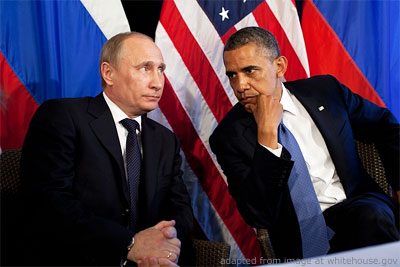Americans in Moscow Feel Chill in US-Russia Relations

(Voice of America – James Brooke – May 28, 2014) The American confrontation with Russia over Ukraine has caused relations between Moscow and Washington to plummet to the lowest level in a generation.
American school children singing the Star Spangled Banner in the ballroom of Spaso House, the neoclassical ambassador’s residence in the heart of Moscow, seemed to signal that all is on track in Russian-American relations.
But after the closed-door embassy meeting with 300 American residents in Moscow, it was clear that many here feel the Russia-U.S. relationship has gone off the rails (is greatly troubled).
For starters, construction engineer Oskare Karash noted that there is still no American ambassador here, three months into the Crimean crisis. No successor has been nominated to succeed Michael McFaul, who left Moscow on February 26 – the day before Russia started to annex Ukraine’s breakaway territory.
“There is a lot of propaganda on Russian TV. And people’s opinions changed. People who before felt good about Americans, they started to get bad ideas, wrong ideas. [There should be] Somebody in the correct role, who could talk at a high level, and stop some of that,” said Karash.
Some American men asked U.S. diplomats about visas for their Russian girlfriends, but Alex Geller worried about a different kind of Visa.
In reprisal for American sanctions, Russia’s parliament passed legislation that threatens to drive Visa and MasterCard, which have about 30 million Russian credit-card accounts, out of business in Russia.
Here is Geller, managing partner of an Internet company in Moscow:
“Can you imagine? You have to go to the doctor, you have to grab the cash. You have to go to any store, you have to grab cash. You want to a buy a ticket online, you cannot do that,” said Geller.
It now looks like Russia will come up with a solution that will allow the American credit companies to stay.
Phil, an American lawyer, said he has lived here for a decade. Since the Ukraine crisis, he says, it is difficult to have normal conversations with Russian friends.
“I have opted to keep my mouth shut. I am not good that. But I keep more friends that way,” said Phil.
Americans say they are coping with an abrupt change in mood.
Pujan Kasaju has worked in real estate finance here for two years:
“There were always questions: What’s it like to live in America? Why did you come to Russia from America? Why would you leave a great country like America? Now it’s like, What the hell are you guys doing? There is a sense of disenchantment,” said Kasaju.
Tit-for-tat
No Americans interviewed said they have suffered harassment. But Kasaju saw photos on the Russian Internet showing hand-made signs on food kiosks and ice cream stands.
“‘Americans are not allowed to buy our products, because we have enacted our own sanctions.’ So, it’s like a big joke. But maybe there is some half-seriousness to it,” he said.
Several Americans blamed Washington for misreading Russian psychology. For the last 12 years, Marilyn Murray has shuttled between Arizona and Moscow. Here she teaches trauma therapy to Russian health-care professionals.
Because of Russia’s flat geography, she says, it has often been invaded. As a result, Russians defend themselves by relying on the fear factor.
“They have had to establish a fearsome image to keep their predators away. And so, even if you look at what their symbol is. It is this bear, this huge Russian bear, that says, ‘Fear me! If you don’t respect and fear me, I am going to eat you!’ They have had to do that for centuries for self-protection,” said Murray.
Murray says Washington made a mistake by not, at least, faking fear of Russia.
“When U.S. government officials make a comment that Russia is no longer a threat, they act dismissive toward them, as though they are irrelevant, they are immaterial, they are not important – insignificant, inconsequential, just don’t matter any more. Number one, it is very scary for a Russian [to realize] ‘Oh, these people no longer fear us.’ But the other thing that is really, really important – that many people don’t realize – is how much they take that personally,” she said.
For Americans living in Moscow, Russia can seem suddenly unfriendly and unprofitable. But friendliness was the treatment received by one American visitor tracked down for an interview in the halls of the old Soviet Army Museum.
Christopher Arndt was visiting Moscow from Pennsylvania:
“I had a gentleman just today, when I was standing looking kind of clueless, with the map in front of my face, offer to drive me over to the museum, because he couldn’t quite explain it in English. And I sure could not understand him in Russian,” said Arndt.
During this tourist season, Arndt’s experience may be a rarity. Tourism professionals say the chill in Russia’s relations with the West will cut American and European visitors here by at least 30 percent this year.
